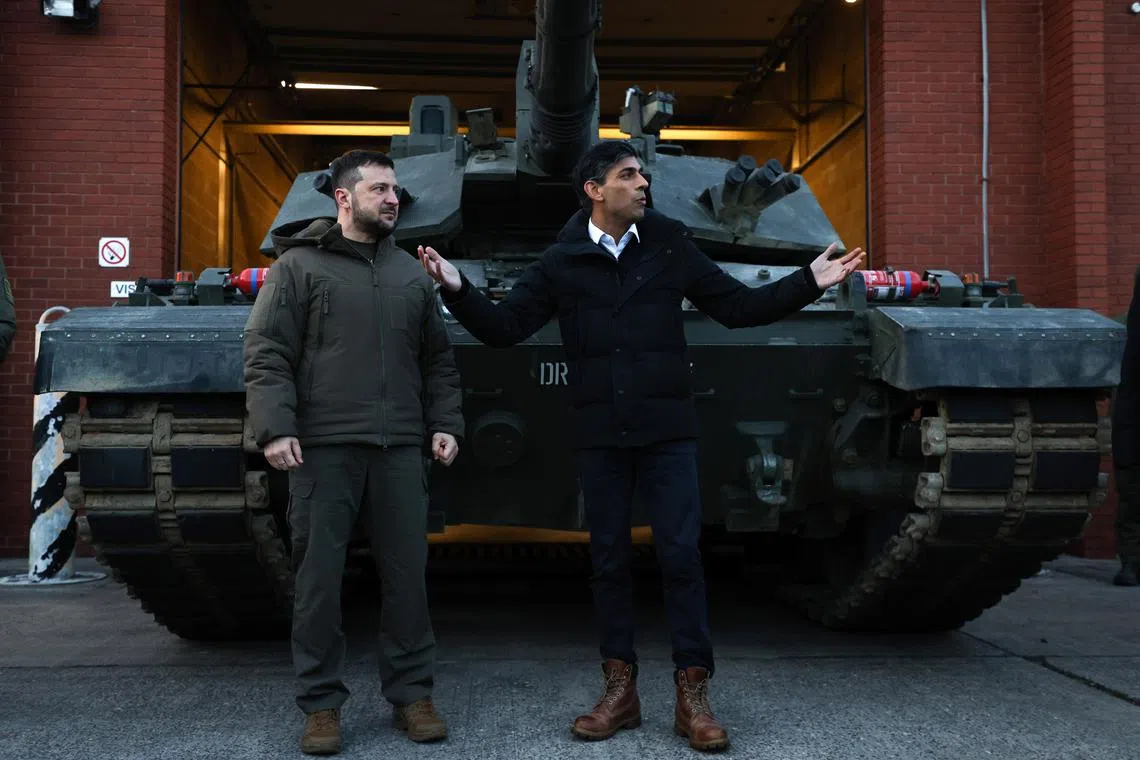British arms could be made in Ukraine under licence, Telegraph says
Sign up now: Get ST's newsletters delivered to your inbox

Ukraine President Volodymyr Zelensky (left) and British PM Rishi Sunak meeting with Ukrainian tank crews being trained to use British Challenger 2 main battle tanks in Lulworth Camp, Britain, on Feb 8, 2023.
PHOTO: EPA-EFE
LONDON – British arms and military vehicles could be manufactured in Ukraine under licence, easing Kyiv’s dependence on supplies of arms from Western allies, the Telegraph newspaper reported on Sunday.
The British paper said the country’s defence industry executives travelled to Kyiv to discuss plans to set up joint ventures to manufacture weapons and vehicles locally.
Manufacturers from other European countries were also in discussions with Ukraine, it said, citing one executive as saying there was a race to put Britain “at the front of the queue”.
Ukraine’s President Volodymyr Zelensky travelled to London and Paris last Wednesday to appeal for more Western arms
British Prime Minister Rishi Sunak told him that “nothing is off the table” when it comes to supplying Ukraine with fighter jets to fight Russia, after he announced a plan to start training Ukrainian pilots to fly Nato-standard warplanes.
Western countries, however, have so far stopped short of providing jets
In response, Russian news agency Tass cited Moscow’s embassy in Britain as warning that any delivery of British fighter jets to Ukraine would have serious military and political ramifications.
Any joint venture between a defence manufacturer and Ukraine would likely need British government sign-off, and such a move would further antagonise Moscow, the Telegraph said.
Mr Sunak’s press office at No. 10 Downing Street declined to comment on the report. The Ministry of Defence also declined to comment.
Meanwhile, a 53-year-old woman was killed on Sunday morning after Russian forces shelled an apartment building in the south-eastern Ukrainian city of Nikopol, the regional governor said.
Governor Serhii Lysak added that an 87-year-old woman was also wounded in the attack, which he described as an artillery strike.
Nikopol sits across the Dnipro River from the Zaporizhzhia nuclear power plant, which has been occupied by Russian forces since shortly after they invaded Ukraine on Feb 24 last year.
Mr Yevgeny Prigozhin, founder of Russia’s Wagner Group, said on Sunday that the mercenary force had taken the village of Krasna Hora on the northern edge of the embattled Ukrainian city of Bakhmut.
Reuters could not independently verify that the village had been taken.
Bakhmut, a city in the eastern Donetsk region, has been the scene of brutal warfare for months. Kyiv’s top military commander Valeriy Zaluzhnyi said on Saturday that Ukraine continues to hold Bakhmut, trying to “stabilise” the frontline around it.
In an audio message published by his press service on the messaging app Telegram, Mr Prigozhin said: “Today, the settlement of Krasna Hora was taken by the assault troops of the Wagner private military company.”
Mr Prigozhin also published a short video, apparently showing Wagner fighters at the entrance sign to Krasna Hora, which had a pre-war population of 600.
The Wagner Group, a once secretive mercenary force that fought for Moscow’s allies in Africa and the Middle East, has for months spearheaded the assault on Bakhmut, making small but steady gains.
In his audio message, Mr Prigozhin also said that only Wagner troops are fighting within “a radius of, give or take, 50 kilometres” around Bakhmut, and should the city be taken, it would be by Wagner units. He added that Wagner is not fighting in other areas of the front further north or south.
Mr Prigozhin has previously engaged in public feuds with Russia’s Defence Ministry, which he has accused of taking credit for Wagner successes.
Mr Prigozhin said in an interview published on Friday that his forces must capture Bakhmut to proceed with their campaign but faced fierce resistance from Ukrainian defenders.
He also said that it could take two years for Moscow to control the whole of two eastern Ukrainian regions whose capture it has stated as a key goal of the war. REUTERS


